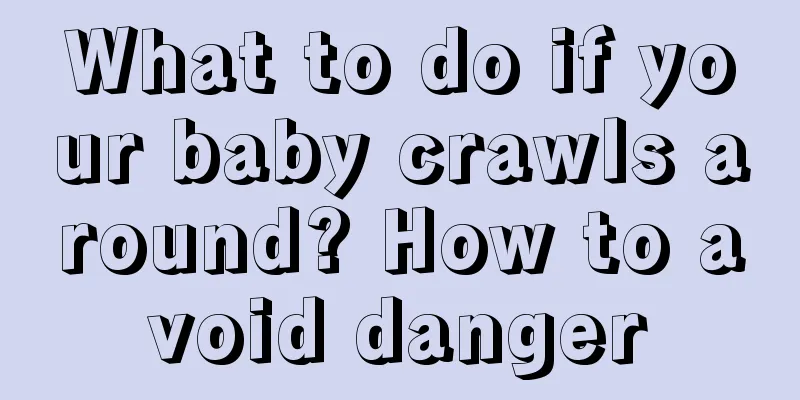What to do if your baby crawls around? How to avoid danger

|
When the baby is seven or eight months old and starts to learn to move his body, it seems that parents have to stay by his side 24 hours a day, always afraid of any mishap. The baby will put his fingers into the socket, pick up interesting things on the ground and put them in his mouth, and climb up and down according to the terrain... Faced with so many situations, parents have to take the baby away from the scene as soon as possible and desperately say no! But, does the baby really understand? Baby can understand, can't you?Babies who are too young really don’t know what is dangerous and what is not allowed! Generally speaking, babies under six months old are limited in their motor response and understanding abilities, so even if they hear adults warning them: “No!”, they still cannot stop the action at the same time. Therefore, when there is a baby under six or seven months old at home, it is recommended that parents first remove dangerous objects or corners at home to prevent the curious baby from facing danger. If the situation is urgent, just quickly take the baby away, because scolding or hitting him will not help! What to do if your baby crawls everywhereUsually, babies can gradually accept adults' advice after they are eight months old. To help babies understand adults' words, exaggerated gestures and expressions, and clear language reminders are very important skills. For example, when a baby is about to touch the socket, the adult can quickly pull the baby's hand back and say: The socket is dangerous! Don't touch it! If you just hit the child hard once and say that he is naughty and disobedient, the child may not dare to do it again for a short time because of fear of being punished, but in fact, his curiosity about the socket still exists. Because the way of saying "not being good! not listening!" only lets the child receive the message of rejection, but he does not know why it is not allowed. If we can say specifically: "The socket is dangerous, no!" or "The water is scalding, don't touch it!", the child will understand that these things may cause harm to him! Say no to your children at the right timeParents usually have two parenting styles. One is that they believe that babies must be strictly disciplined from an early age, but ignores the limitations of children in their movements and language comprehension, so the discipline seems too harsh or even inappropriate. The other view is that the child is still young and does not understand anything, so there are no restrictions at all; but such discipline will also cause the child to become willful and ignorant in the future. Therefore, true love and true openness and respect should follow the child's physical and mental development and provide appropriate and safe guidance. Inappropriate complete openness or complete prohibition is not an appropriate approach. Therefore, only by imposing restrictions and rejections on children in a timely and appropriate manner can children gradually develop good self-control and self-love abilities. |
>>: What is the best age for a woman to have a second child?
Recommend
How to increase nutrition for children who are too thin? What can children who are too thin eat to gain weight?
Usually most children are thin, because many chil...
How many months will a baby spit up milk? Will spitting up milk affect the baby's growth?
It is normal for babies to spit up milk. There ar...
What is the reason for the red spots on the newborn?
My baby has been born for more than a week. In th...
Is it necessary to buy a pregnancy pillow? Which shape of pregnancy pillow is the most practical?
Most pregnant women know that it is very inconven...
Can I cut my hair after a miscarriage? How long after a miscarriage can I cut my hair?
After a miscarriage, you will be unkempt and your...
How old is considered an advanced maternal age? Is it better for an advanced maternal age mother to have a natural birth or a caesarean section?
Many women have to have children in their 30s due...
What should children pay attention to when watching TV
Children watching TV properly is a form of entert...
How much is a bottle of baby flaxseed oil? How many months does a baby eat flaxseed oil?
Flaxseed oil is a very common edible oil in our l...
Is it better for maternity bras to have underwires or without underwires?
Should pregnant women choose underwear with under...
What should I do if my child has ADHD? ADHD coping methods
ADHD is a common disease that many children suffe...
Does cesarean section affect the baby's development? What are the dangers?
Many expectant mothers choose cesarean section to...
Can babies eat strawberries? Is it good for babies to eat strawberries?
When babies are growing and developing, they shou...
Can I share bath towels with others? Is it better to buy cotton or microfiber bath towels?
Generally, personal belongings are not shared wit...
How to relieve itching when your baby is allergic? How to prevent your baby from allergic reactions
Many babies have allergic constitutions, and thei...
The harm of painless childbirth injections and painless childbirth experience
Everyone is familiar with painless childbirth. It...









